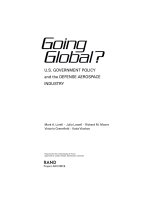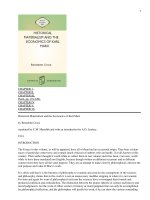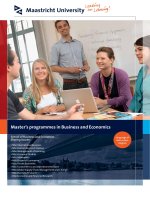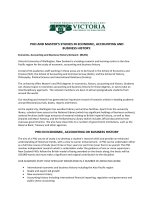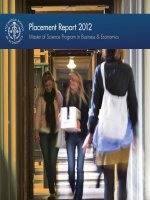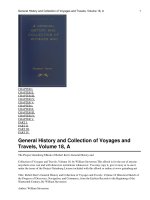Master’s Programme Empirical and Theoretical Economics (ETE) pot
Bạn đang xem bản rút gọn của tài liệu. Xem và tải ngay bản đầy đủ của tài liệu tại đây (275.24 KB, 5 trang )
The Paris School of Economics is an international centre
of excellence in Economics, merging leading research
and teaching institutions and bringing together more
than 300 students enrolled in Master’s and PhD
programmes.
It offers highly selective programmes leading to
professional degrees qualifying students for careers in
teaching and research, business, public administration
and international organizations.
PSE also provides public and private decision-makers
with the best analytical tools that modern scientific
research has to offer.
Master’s Programme
Empirical and Theoretical Economics (ETE)
The Empirical and Theoretical Economics Master’s
Programme of the university of Paris 1 Panthéon-
Sorbonne and the Paris School of Economics offers
graduate economic training tailored to the needs of
students preparing themselves for positions in
academic research and teaching, and administrative
positions with government agencies and international
organizations, banks and financial institutions, as well as
non-profit organizations.
Graduate-level Economics degrees are acquired
through a Master or a Ph.D.
Objectives
The teaching programme of the Master aims to provide
a deep understanding of:
c The methods of microeconomic and
macroeconomic theory;
c The theory and the practice of econometrics;
c The following applications of economic theory:
- the elaboration and evaluation of macro- and
micro-economic policies,
- international trade and globalization,
- labor economics and demographics,
- industrial organization,
- economic behavior under uncertainty.
Futher objectives are:
c To undertake this training in a demanding and
active research environment providing a wide variety
of research seminars
c To develop individual research skills under the
supervision of well-published researchers, and develop
individual writing skills by the writing of various memoirs
and a Master’s dissertation.
Faculty
Jean-Marc Robin
Jean-Olivier Hairault
Jean-Marc Tallon
Bernard Cornet
Lionel Fontagné
David Margolis
André Zylberberg
Fabien Postel-Vinay
Catherine Sofer
Robert Gary-Bobo
Cuong Le Van
Jean-Marc Bonnisseau
Detailed Curriculum
The First-year M1 is dedicated to learning the
fundamentals of microeconomics, macroeconomics,
econometrics and international trade. Two tracks are
proposed. One track is taught in French and is suitable
for French or non-French students with a Bachelor’s
degree in Economics (or the equivalent).
A specific, very intensive English training programme is
proposed to students with a limited knowledge of
Economics and Statistics but a good mathematical
background: the Erasmus-Mundus program,
Quantitative Economics Methods.
M1
Credits
ECTS
Linear Econometrics
5
Time Series
5
Industrial Economics
5
International Trade
5
Economic Policy
4
Game Theory
4
Applied Microeconometrics with SAS
4
Institutions and Regulation
4
Environmental Economics
4
History of Economic Thought
4
Development Microeconomics
4
European Integration
4
Global Macroeconomics
4
Microeconometrics
5
Microeconomic Theory 5
Macroeconomics
5
Financial Changes and Monetary Policy
5
Applied Macroeconomics
4
Applied Microeconometrics
4
Development Policy
4
Transition Economics
4
Development Macroeconomics
4
The Second-year M2
offers a certain amount of
specialization. It includes advanced coursework
covering micro- and macro-econometrics, decision
theory and the treatment of information, industrial
organization, theoretical microeconomics and game
theory, business cycle and stabilization policies, growth
and environmental economics, labor economics and
policies, international trade and macroeconomics,
population economics and demographics. These
topics are covered in one fundamental course (36
hours) and various advanced courses (18 hours each).
M2 Students are required to select four fundamental
courses and six advanced courses, and write a
Master’s dissertation. The second year is taught in
English.
M2 Load (Hours)
Macroeconomics
The Economic Cycle: Theories and Methods 36
Simulation and Evaluation of Macroeconomic Policies 18
Monetary macroeconomics 18
Economics of Taxation 18
Financial Macroeconomics 18
Growth and Innovation 36
Life Cycle, Fertility, Altruism 18
Globalization and Growth 18
Time Series 36
Non-linear Time Series 18
Intertemporal Optimisation and Dynamic Programming 18
M2 Load (Hours)
Microeconomics
Applied Microeconometrics 36
Non-Parametric Econometrics 18
Duration Models 18
Panel Data
18
Risk, Information and Time 36
Behavioural Economics
18
Networks and Social Interactions
18
Experimental Economics
18
Social Choice
18
Decision in Uncertain Contexts
18
Labor and Household Economics 36
Demographic Economics
18
Economics of Education
18
Personnel Economics
18
Industrial Economics, Contracts and Incentives
36
Empirical Industrial Economics
18
Compettion Policy
18
General Equilibrium Theory 36
Financial Market Equilibrium
18
Bargaining Theory
18
Game theory
18
International Trade
International Trade: Theory and Applications 36
Applied Geographic Economics 18
Foriegn Direct Investment 18
Economics of Migration 18
International Macroeconomics 36
Exchange Rates 18
Trade and Growth 18
Admissions
All candidates for the ETE Master’s degree are subject
to a selective admission process. Candidates must
demonstrate an aptitude for learning the analytical
and quantitative tools that are the hallmark of the
training at PSE.
Career Opportunities
The career opportunities for young PhDs are academic
positions in French or international universities, research
institutions and international organisations. Students will
benefit from the excellence of the PSE research units
when entering the Academic Job Market.
For students with the Master’s degree, non-academic
positions such as economist or statistician in national
administrations in France, Europe and other countries,
international organisations, bank and insurance
companies will be the main career opportunities.
Contact information:
Tel: +33 1 44 07 81 06
Email:
URL: www.parisschoolofeconomics.eu
PARIS SCHOOL OF ECONOMICS, MARCH 2009

